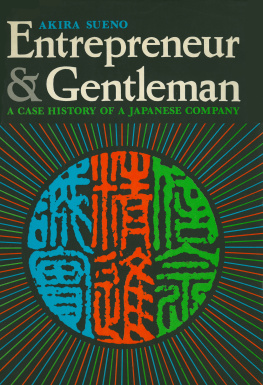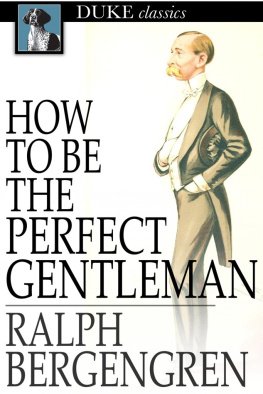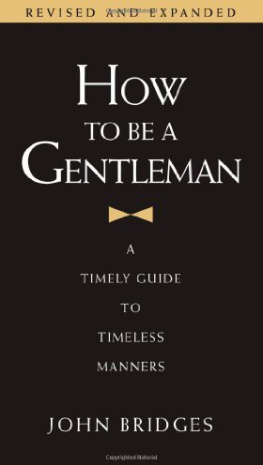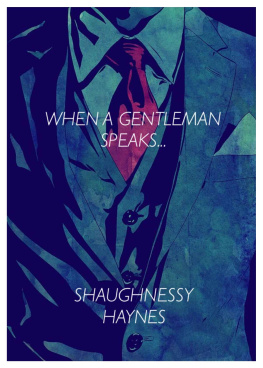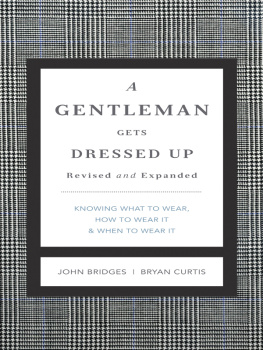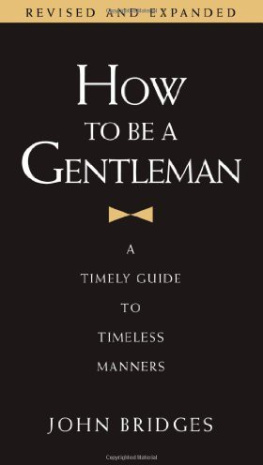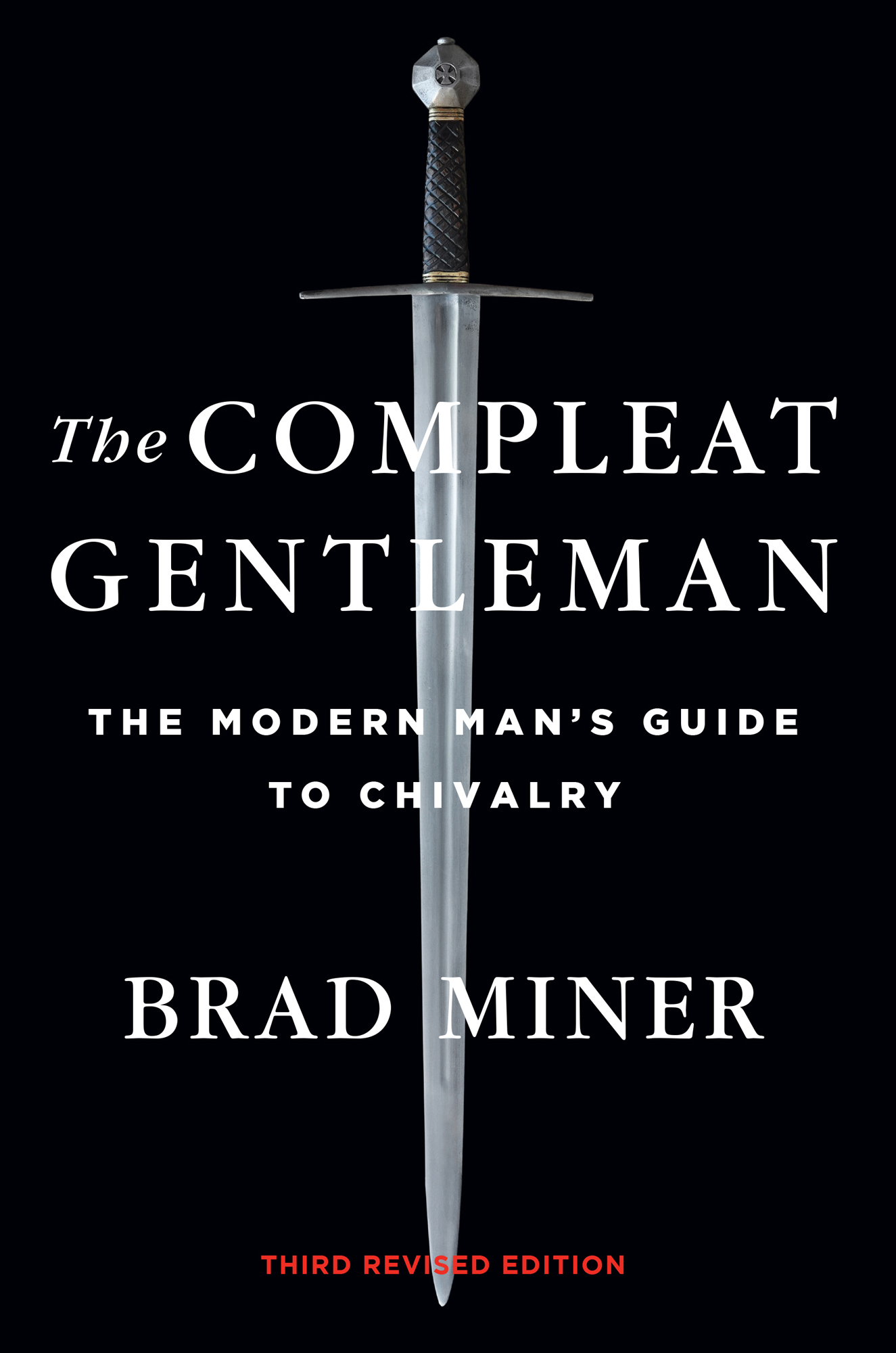
The Compleat Gentleman
The Modern Mans Guide to Chivalry
Brad Miner
Third Revised Edition
For Dorothy Caroline Miner
May you always know and love compleat gentlemen and be loved by them.
My friend, blood shaking my heart
The awful daring of a moments surrender
Which an age of prudence can never retract
By this, and this only, we have existed
Which is not to be found in our obituaries.
T. S. Eliot, The Waste Land
Preface to the Third Edition
A lthough it was originally published in 2004, I wrote The Compleat Gentleman mostly during 2000 and 2001. I wont say it created a sensation when it first appeared, but it did make an impression, and I was able to appear often on radio and TV to talk about the book. I heard a great deal from hosts and listeners about whats known as the takeawaythose aspects of the subjects of chivalry and gentility that folks found most interesting, if not to say provocative. That this current version is the third (a second appeared in 2009) is evidence of why Ive sometimes said with wonder about the book, It will not die!
What I learned during the research and writing of The Compleat Gentleman, and from the hundreds of interviews about it, is that there is a worldwide longing for civility. One example: many Americans are genuinely distressed about the nations dwindling appreciation for etiquetteat the boorishness of some of our fellow citizens and at the rancor in our public conversations, especially about politics and religion. This was not a surprise to me, but I admit to being disappointed at first that folks wanted to talk about manners and didnt want to talk about history. The book devotes but a few paragraphs to etiquette. But the more interviews I did the more I came to understand that people really do grasp that the traditional rules of behavior are simply the big ideas of civilization writ small, which is a good definition of etiquette. Another example: during the mayoralties of Rudy Giuliani and Mike Bloomberg, crime in New York City declined, in part because those mayors accepted the broken windows approach to policing. The point of that policy is that if misdemeanors are ignored, felonies will follow, whereas if you crack down on petty crime, big crimes will be prevented. The Antifa protests of 2020 are boorishness writ large.
I was also surprised at how many women wanted to talk about their sons. Its a favorite subject of mine, because I have two sons and because being their father is both my greatest accomplishment and my profoundest joythat and being their mothers husband. The callers with whom I spoke worried that their boys werent tough enoughthat they were being alternately bullied and coddled by teachers and coaches and other authority figures (or role models). Well, being neither a teacher nor a coach, I suggested that mothers and fathers remember that the crucible of character is neither the classroom nor the gym but the family. Toughness is as much spiritual as physical, and the former comes first.
Ah, but then I always come back to the importance of really knowing how to fight. Chivalry is first and foremost the worldview of fighting men, and I am convinced that the decline of the gentlemanly ideal has occurred at least in part because men really are flabbyphysically and spiritually. This observation seemed to anger men with whom I spoke, many of whom said something to this effect: I dont know how to fight, but still I consider myself chivalrous.
Well, I am not the Tsar of All the Gentlemenone reviewer, a pale and flabby fellow Im sure, wrote: Mr. Minor [sic] himself may hope that a new cult of the gentleman, and the gentlemen to go with it, may be brought into existence by the book itself, but that seems to me to be most unlikely unless he can also provide them with something more than the conceit of their own gentlemanlinessI have to insist that, whereas any man is certainly free to call himself what he wishes, without a sword (so to speak) he cant be chivalrous. Words have meaning, and we should respect them.
A personal anecdote: When my older son, who would become Captain Robert B. Miner II (U.S. Army), was in high school, we took my younger son Jon paintballing to celebrate his sixteenth birthday. After one of the games, I dragged myself back to the base, a cinderblock building with a snack bar, and came upon Bobby, leaning back in a chair, feet up on a table, wearing the olive-drab coveralls provided, with his paintball gun across his chest. He had recently decided to accept an appointment to the United States Military Academy at West Point, and I could see already the soldier he would become. One of the other boys along for the party said, Bobby, tell your dad about your career plan.
And Bobby said, holding up a finger to indicate each step, West Point. Special Forces. Ultimate Fighting. Batman.
Now thats tough.
Ive found that Bobby and Jon and young men like them admire Bruce Wayne rather more than Clark Kent, because WayneBatmanisnt so much a superhero as simply a hero. He has no alien or accidental superpowers like Superman or Spiderman. Hes an ordinary man with extraordinary amounts of skill, passion, determination and, yes, a really extraordinary amount of money too.
This book is for such ordinary men who believe in love and learning but also in fightingwho know there are things worth fighting for and are willing and able to rise to the challenge, and I rededicate it to my sons and to all young men for whom duty, honor, and country are words to live by.
But (theres always one of those) even in 2009, although political correctness was already rampant, I for one could not have predictedcould not have imaginedthat in 2020 the media and certain groups of Americans would be obsessing about toxic masculinity. The reader is assured that, although I have listened to this and other criticisms of men, I have changed my view of the gentleman and chivalry not one whit.
For reasons explained in Chapter 3, in this book I name just two men compleat gentlemen: Robert E. Lee and Sidney Poitier. Imagine my disappointment (closer to disgust) when I read that on May 19, 2017, New Orleans had removed its statue of Lee from Lee Circlewhich civic space remains to be renamed.
My Shorter Oxford English Dictionary defines iconoclasm as the destruction of or opposition to religious images, and an iconoclast as a person who attacks a cherished belief or respected institution. The dictionary notes the religious movements (in eighth- and ninth-century Orthodox Christianity and sixteenth- and seventeenth-century Puritanism) that have opposed the veneration of images. Perhaps Islam could be included. (Im thinking in particular of the Talibans destruction of the nearly fifteen-hundred-year-old Bamyan Buddhas in Afghanistan in March of 2001. This was clearly a precursor to the September 11 attacks in New York and Washington against what al Qaeda, allies of the Taliban, considered icons of Western civilization.) The OED adds that an iconoclast attacks cherished beliefs or venerated institutions on the grounds that they are erroneous or pernicious. And this applies not only to religion but also to politics and history.
Theres another phrase thats even more applicable to what weve been lately seeing in the United States: damnatio memoriae. The meaning is clear. Its akin to the De-Stalinization that the Soviets began in about 1955. Of course, I would judge that an example of good iconoclasmthe


